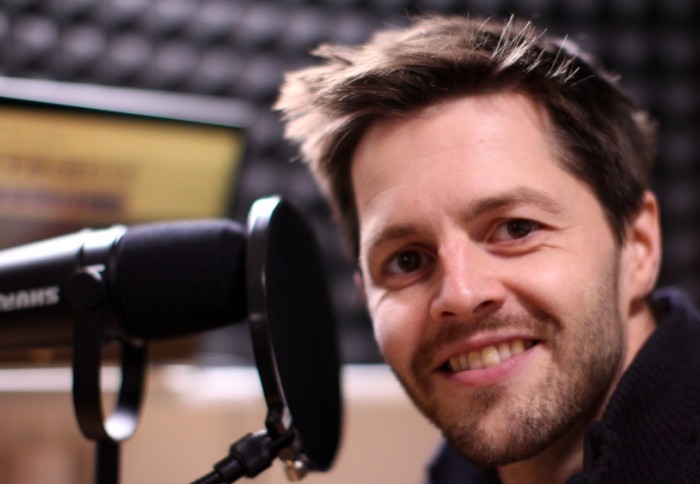Becoming an environmental activist: Q&A with the host of Tipping Points

Pete Knapp
Series two of Tipping Points, a podcast which shares the personal stories of environmental activists, launched on Christmas Eve.
A recent poll revealed that climate change, the environment and pollution are now the British public’s number one concern, exceeding both COVID-19 and Brexit. However not everyone is driven to act upon their concerns. What pushes people to make this step? When do individuals reach their ‘tipping point’ and become an activist?
Pete Knapp, environmental activist and Imperial research postgraduate studying indoor air pollution, explores these questions further in ‘Tipping Points’, a podcast series supported by the Grantham Institute – Climate Change and the Environment.
Following a successful first series, in which Pete speaks with a number of scientists who became environmental activists, we caught up with Pete about his experience, what motivates him and his plans for series two.
As the host of ‘Tipping Points’, you must have had a ‘tipping point moment’ yourself. What was it that led you to environmental activism?
Different people have different reasons for becoming activists, but I’ve noticed a general theme. There is always something that they saw, or read, or did, which opened their eyes to something that was already in the back of their mind. For me, this happened when I was living in Bristol. I came across this book ‘Hope in Hell: A decade to confront the climate emergency’ by Jonathon Porritt, and it was a real eye-opener. There was a lot of stuff in there that I didn’t know, and it was very scary. Looking into the subject in more detail, it became obvious that we’re in quite a lot of trouble and we haven’t done very much to deal with it.
I was in shock. How had world leaders had allowed this to happen? This wasn’t a new question for me. Before all this, I was living Beijing, where I found myself asking similar questions, relating to the level of air pollution. This was the reason I chose to change my research interest from antimatter physics to air quality.
I realised my changes weren't impacting the bigger picture, and the effect of being in a group was much greater.
Following the realisation that world leaders weren’t tackling these issues, I started to see things through a different lens. I threw myself into researching what I could do as an individual. I stopped flying, I changed my diet, I would collect all the litter I could find on walks, only to turn a corner to discover ten times as much. I felt defeated. I realised individual changes weren't impacting the bigger picture, and the effect of being in a group was much greater. That's when I decided to join Scientists for Extinction Rebellion (XR).
What led you to start this podcast?
When I joined Scientist for XR, I became part of this WhatsApp group of 200 or so anonymous individuals. I had no idea who they were or what led them to be in the group. I wanted to know what had motivated them to join, a decision that could potentially put their careers and livelihoods at risk. I thought others would be interested to know as well, and so I started a podcast.
I also wanted the podcast to help others who have reached their ‘tipping point’ and may be struggling to adjust, as it was something I was experiencing myself. How has this affected the decisions you make: what to buy, how to travel, which petition to sign? How do you discuss your concerns with loved ones, colleagues and friends? I asked these questions because I needed help with my own journey, but I knew that others would benefit from their answers too. It helps to know you’re not alone.
So, as I was joining Imperial, I contacted the Grantham Institute with the first few episodes, to see if they would be interested in helping these conversations reach a wider audience. And, happily, they were.
Now that series one is complete, what are your plans for series two?
Climate change is about stories, not just statistics, facts, and figures.
Climate change is about stories, not just statistics, facts and figures. For series two I want to focus on other aspects of society that have a role to play in raising awareness about climate and ecology. I want to know why a newly qualified pilot would quit before paying back a substantial aviation college debt, and what would make someone stop work as a police officer and instead become an activist. I want to share stories that will resonate with a diverse range of people, outside the scientific community.
I am also asking listeners to send in questions. I want to know what they would like to ask a doctor, a lawyer, a pilot, a tabloid journalist, a teacher, a police officer, an Olympic athlete, and an actor, all of whom have become activists. Maybe I’ll get some questions I’ve never even considered. This I believe has the potential to make this podcast even richer.
 In you have any questions for these upcoming guests, or feedback on series one, please send them to tippingpoints@imperial.ac.uk. (Please see our privacy notice).
In you have any questions for these upcoming guests, or feedback on series one, please send them to tippingpoints@imperial.ac.uk. (Please see our privacy notice).
The first episode of series two, which focuses on the role of religion in the climate crisis, was released on Christmas Eve.
Subscribe to the podcast wherever you listen so you don’t miss it. Series one is available to listen to on Podbean, Spotify, Amazon music, Audible, and Google Podcasts.
This podcast was supported by Imperial’s Rapid Response Seed Fund for Societal engagement.
Article supporters
Article text (excluding photos or graphics) © Imperial College London.
Photos and graphics subject to third party copyright used with permission or © Imperial College London.
Reporter
Samantha Ibbott
The Grantham Institute for Climate Change